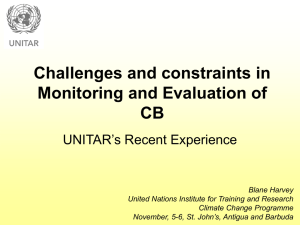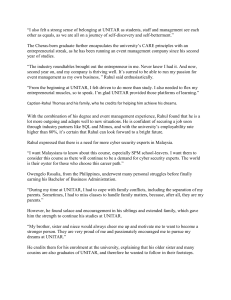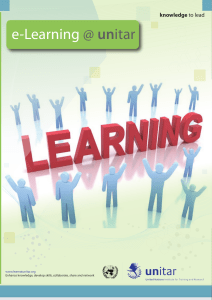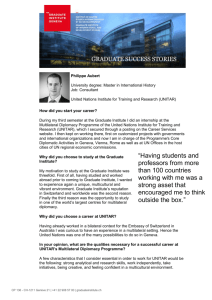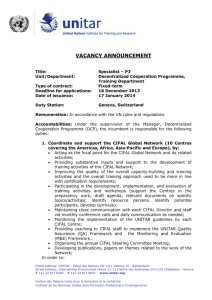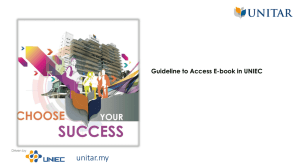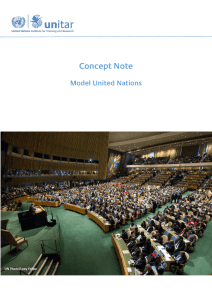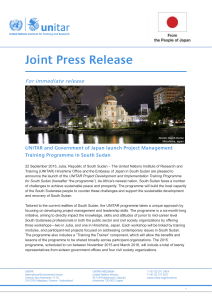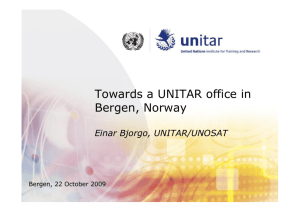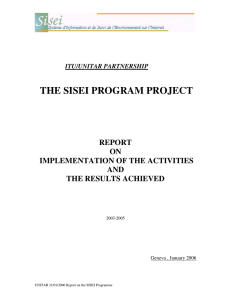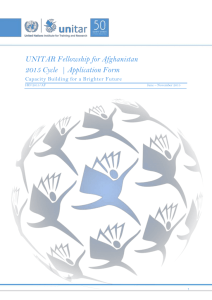Abstracts
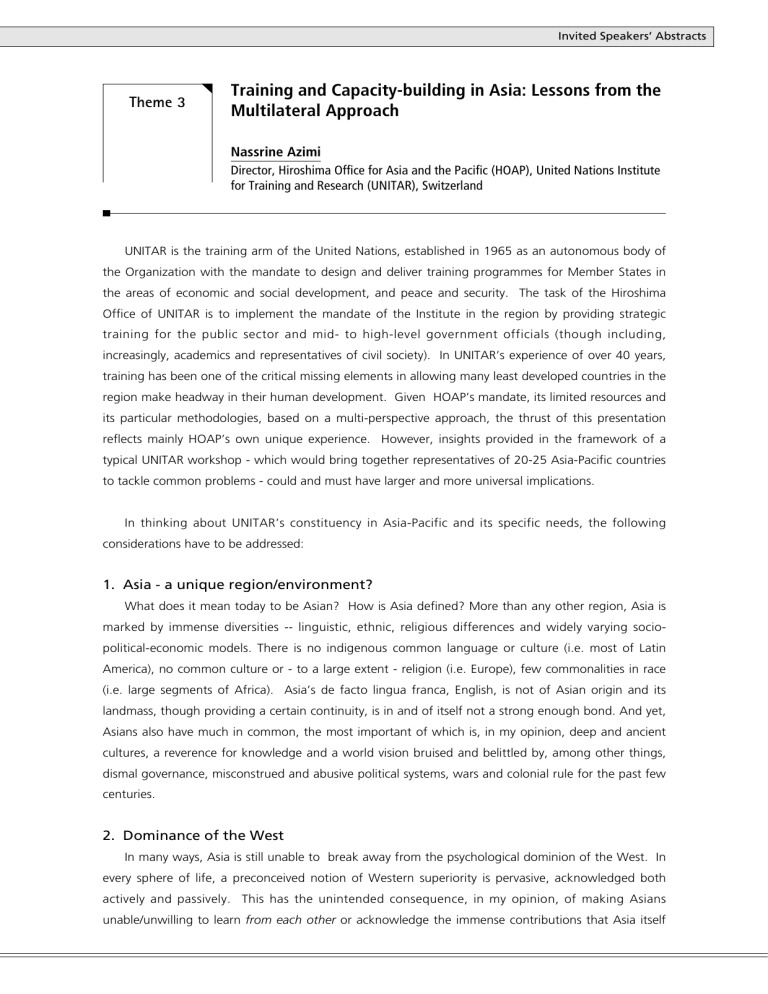
Invited Speakers’ Abstracts
Theme 3
Training and Capacity-building in Asia: Lessons from the
Multilateral Approach
Nassrine Azimi
Director, Hiroshima Office for Asia and the Pacific (HOAP), United Nations Institute for Training and Research (UNITAR), Switzerland
UNITAR is the training arm of the United Nations, established in 1965 as an autonomous body of the Organization with the mandate to design and deliver training programmes for Member States in the areas of economic and social development, and peace and security. The task of the Hiroshima
Office of UNITAR is to implement the mandate of the Institute in the region by providing strategic training for the public sector and mid- to high-level government officials (though including, increasingly, academics and representatives of civil society). In UNITAR’s experience of over 40 years, training has been one of the critical missing elements in allowing many least developed countries in the region make headway in their human development. Given HOAP’s mandate, its limited resources and its particular methodologies, based on a multi-perspective approach, the thrust of this presentation reflects mainly HOAP’s own unique experience. However, insights provided in the framework of a typical UNITAR workshop - which would bring together representatives of 20-25 Asia-Pacific countries to tackle common problems - could and must have larger and more universal implications.
In thinking about UNITAR’s constituency in Asia-Pacific and its specific needs, the following considerations have to be addressed:
1. Asia - a unique region/environment?
What does it mean today to be Asian? How is Asia defined? More than any other region, Asia is marked by immense diversities -- linguistic, ethnic, religious differences and widely varying sociopolitical-economic models. There is no indigenous common language or culture (i.e. most of Latin
America), no common culture or - to a large extent - religion (i.e. Europe), few commonalities in race
(i.e. large segments of Africa). Asia’s de facto lingua franca, English, is not of Asian origin and its landmass, though providing a certain continuity, is in and of itself not a strong enough bond. And yet,
Asians also have much in common, the most important of which is, in my opinion, deep and ancient cultures, a reverence for knowledge and a world vision bruised and belittled by, among other things, dismal governance, misconstrued and abusive political systems, wars and colonial rule for the past few centuries.
2. Dominance of the West
In many ways, Asia is still unable to break away from the psychological dominion of the West. In every sphere of life, a preconceived notion of Western superiority is pervasive, acknowledged both actively and passively. This has the unintended consequence, in my opinion, of making Asians unable/unwilling to learn from each other or acknowledge the immense contributions that Asia itself
has made to the world of ideas, science or even governance. In this respect, most existing training and capacity building methodologies are based on values and belief systems different from Asia (from time to time the ‘international’ norms or approaches UNITAR adopts in its workshops fall flat, as clearly not acceptable/logical to Asian participants for example). The quest for excellence is absolutely universal and there are immense lessons to take from the West indeed. There is however also room to develop methodologies based on Asia’s unique circumstances, and its own value systems.
3. Training not bound by a need for the perfect environment
There is a myth that an ideal socio-political condition is a pre-requisite to implement any larger policy of human capacity building. Our experience has demonstrated however that one can start from where one is (Afghanistan today and, historically, Japan and South Korea in the 40s and 50s for example). There are ways to develop human capacity even when the ideal political, economical and social structures are not in place. Indeed, well-thought out training programmes could actually provide a feed-back loop for better governance.
4.
Quid
Japan?
There are many pockets of excellence in Asia. China’s (and to a lesser degree India’s) economical and diplomatic rise is foremost on everyone’s mind when thinking about the Asian century. But Japan’s own impressive development, from the ruins of WWII to the second largest economy in the world, remains a model for and an inspiration to many countries (UNITAR’s Afghan programme participants for example frequently express admiration for Japan’s developmental model, attained even as its specific culture and social models have - to some extent - remained in place). Japan has also been a generous ally for Southeast Asia, investing in the region, providing much needed developmental assistance and aid. However, Japan has much more to offer from its intellectual and technological capital, still inaccessible to other countries due to the language and to some extent cultural barriers.
Are there ways for Japan to unlock its prowess further, for the benefit of the region? Can there be a coalition of the able, for the more developed countries/communities in Asia to document their experience and know-how more systematically so that it can be shared with others in the region? In my opinion this will fully take off when, like Europe, Asia comes to term with its own turbulent history and unresolved past which continues to weigh heavily on its potential for development.
5. Missing synergies
Human capacity-building is particularly relevant and necessary in the public sector which, unlike the private sector today, is not the recipient of many internationally bench-marked executive training programmes. This imbalance leaves many least developing and post-conflict countries with an increasingly dynamic (or at least energized and able) private sector but a bloated and frequently illequipped public sector to support/complement it, creating mutual hindrances, with each side viewing the other as an obstacle rather than an ally in the developmental process (all successful examples in
Asia itself - Japan, Singapore, Malaysia etc - point toward the need for a strong public sector to support a robust private sector).
Invited Speakers’ Abstracts
Also, unlike the West, and more specifically the United States, the role of Asia’s academia and think-thanks in grand intergovernmental or public/private sector initiatives is limited. Part of this is caused by the Asians attachment to and reverence for ‘traditional’ forms of scholarly pursuit. But clearly this is not enough. Asians are unable to tap into the huge reservoir of intellectual and professional capital within their own universities. The United Nations - and institutions such as UNITAR
- should provide and promote larger canvasses such as the Millennium Development Goals for example, as meeting grounds for Asia’s own quest for development and excellence.
